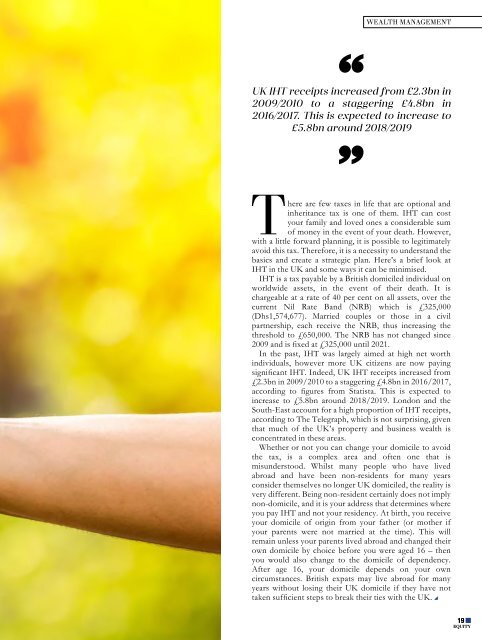Equity Magazine November 2017
- No tags were found...
You also want an ePaper? Increase the reach of your titles
YUMPU automatically turns print PDFs into web optimized ePapers that Google loves.
WEALTH MANAGEMENT<br />
UK IHT receipts increased from £2.3bn in<br />
2009/2010 to a staggering £4.8bn in<br />
2016/<strong>2017</strong>. This is expected to increase to<br />
£5.8bn around 2018/2019<br />
There are few taxes in life that are optional and<br />
inheritance tax is one of them. IHT can cost<br />
your family and loved ones a considerable sum<br />
of money in the event of your death. However,<br />
with a little forward planning, it is possible to legitimately<br />
avoid this tax. Therefore, it is a necessity to understand the<br />
basics and create a strategic plan. Here’s a brief look at<br />
IHT in the UK and some ways it can be minimised.<br />
IHT is a tax payable by a British domiciled individual on<br />
worldwide assets, in the event of their death. It is<br />
chargeable at a rate of 40 per cent on all assets, over the<br />
current Nil Rate Band (NRB) which is £325,000<br />
(Dhs1,574,677). Married couples or those in a civil<br />
partnership, each receive the NRB, thus increasing the<br />
threshold to £650,000. The NRB has not changed since<br />
2009 and is fixed at £325,000 until 2021.<br />
In the past, IHT was largely aimed at high net worth<br />
individuals, however more UK citizens are now paying<br />
significant IHT. Indeed, UK IHT receipts increased from<br />
£2.3bn in 2009/2010 to a staggering £4.8bn in 2016/<strong>2017</strong>,<br />
according to figures from Statista. This is expected to<br />
increase to £5.8bn around 2018/2019. London and the<br />
South-East account for a high proportion of IHT receipts,<br />
according to The Telegraph, which is not surprising, given<br />
that much of the UK’s property and business wealth is<br />
concentrated in these areas.<br />
Whether or not you can change your domicile to avoid<br />
the tax, is a complex area and often one that is<br />
misunderstood. Whilst many people who have lived<br />
abroad and have been non-residents for many years<br />
consider themselves no longer UK domiciled, the reality is<br />
very different. Being non-resident certainly does not imply<br />
non-domicile, and it is your address that determines where<br />
you pay IHT and not your residency. At birth, you receive<br />
your domicile of origin from your father (or mother if<br />
your parents were not married at the time). This will<br />
remain unless your parents lived abroad and changed their<br />
own domicile by choice before you were aged 16 – then<br />
you would also change to the domicile of dependency.<br />
After age 16, your domicile depends on your own<br />
circumstances. British expats may live abroad for many<br />
years without losing their UK domicile if they have not<br />
taken sufficient steps to break their ties with the UK.<br />
19<br />
EQUITY
















